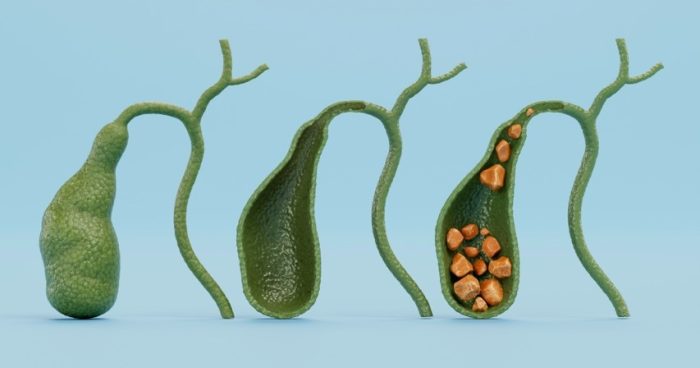About Gallstones
The Gallbladder and Bile - Functions
The gallbladder is a pear-shaped organ below your liver at the upper right side of your abdomen.
The primary function of the gallbladder is to store and concentrate bile, a digestive fluid produced by the liver. The gallbladder itself does not produce bile juice.
Bile is produced by the liver and then stored and concentrated in the gallbladder. Bile juice contains water, electrolytes, bile acids, cholesterol, bilirubin, and other substances.
When you eat a meal, signals from the digestive system prompt the gallbladder to contract and release bile into the small intestine through the common bile duct. The bile helps emulsify fats, making them easier to digest and absorb. The gallbladder acts as a storage and concentration reservoir for bile, allowing it to be released in a more controlled and concentrated form when needed for digestion.
How are Gallstones formed?
Gallstones are formed in the gallbladder when there is an imbalance in the substances that make up bile, a digestive fluid produced by the liver. Bile contains cholesterol, bile salts, and bilirubin, among other components. When these substances are not in the proper balance, they can form solid particles that gradually grow into gallstones.

Several factors contribute to the formation of gallstones:
- Excess cholesterol in bile
When the liver produces more cholesterol than the bile can dissolve, it can lead to the formation of cholesterol stones.
- Impaired gallbladder function
If the gallbladder does not contract and empty properly, bile can become concentrated, promoting the formation of gallstones.
- Obesity
Being overweight or obese is a risk factor for gallstone formation.
- Rapid weight loss
Losing weight too quickly can cause the liver to release extra cholesterol into the bile, leading to gallstone formation.
- Pregnancy
Pregnancy increases the risk of gallstone formation due to hormonal changes that affect gallbladder function.
- Certain medical conditions
Conditions such as diabetes, liver cirrhosis, and certain blood disorders can increase the risk of gallstones.
Consult our Gallbladder Specialist, Dr Lee Lip Seng for a detailed diagnosis & treatment plan. Dr Lee is professionally skilled in minimally invasive surgery and experienced in managing gallbladder diseases.
At LS LEE Surgery, we ensure continuity of care throughout every phase of our patients’ surgical journey, from pre-operative care to post-operative care.





